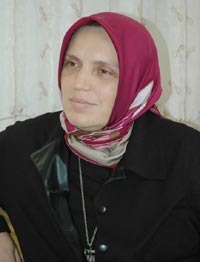Heinrich Böll Foundation Publication
Turkish Feminists Discuss Effects of Religion on Women
The Heinrich Böll Foundation has published a book concerned with feminism, entitled, "Gender Discussions in Turkey". The book was published in August 2007.
The first part of the book looks at international experiences. The second part is the result of four discussion workshops held in autumn 2006. The third part is about gender equality and touches on the campaign of the Association to Support and Educate Women (Parliamentary) Candidates (KA-DER).
"Concept of Islamism is outdated"
One article starts with a redefinition of religious feminists:
"During the workshop, some religious feminist participants objected to their introduction as 'Islamist feminists', saying that the concept of 'Islamism' was outdated, and that 'Islamists' believed that all mechanisms needed to be shaped by religious rules and thus opposed laicist orders. Because religious people did not have any problem with the system, they said it was more correct to call them 'religious feminists'.
Ulrike Dufner, the foundation's Turkey representative wrote an introduction to the book, said it aimed at answering the question of what the difference between feminism and the mainstreaming of gender equality was.
At a time when there is a heated discussion in Turkey about what would happen if the wearing of headscarves were allowed everywhere, this book is particularly interesting.
Participants in workshops
Participants of the discussion workshops were Nuriye Özsoy and Hidayet Tuksal of the (religious) Capital City Women's Platform, Zozan Özgökce of the Van Women's Association (VAKAD), Handan Koc from the "Monday" magazine, Aksu Bora from the Ankara University Centre for Research on Women's Issues and Implementation (KASAUM), and Nebahat Akkoc and Nilgün Yildirim from the Women's Centre (KAMER).
During an exchange of ideas on religion, the following perspectives were recorded:
- A discourse which says that "the Quran is not absolutely what Allah wants" could be a way of making Muslims more relaxed. The rules set forth in the Quran are clear, but that should not stop people from being able to reinterpret them.
- There has been an increase in divorce because women have outgrown their traditional roles and for other reasons. On the other hand, many mechanisms have been developed which support women in their traditional roles, with the aim of keeping them there. These efforts do not offer a solution. Problems can only be solved by trying to stop violence and developing women-focused strategies.
- The argument that "the family is holy" is used to normalise domestic violence and encourage secrecy. However, the family is not a religious or holy structure, but a sociological unit. In this unit, everyone has the same rights and freedoms. The characterisation of "holy" must be debated, and there must be an end to the legitimisation of violence towards and limitations of women in the name of this "holiness".
- Many religions see women as "a being which needs to be protected" by men. This prevents women from being individuals, from making decisions concerning her own life. Women should not be seen as part of another person, rather as individuals.
- Quite a few religious women have stopped seeing marriage as "submission to a man". This development has positive effects.
- The problems of headscarved women have not been solved, and this cannot be explained solely with the difficulties of changing laws. The headscarf is at the same time a phenomenon which strenghtens the traditional roles of women. Forcing headscarved women to work for lower pay strenghtens the captialist market structure.
- Some inofficial "imams" (who are not affiliated with the Department of Religious Affairs) who are accepted by society have negative attitudes towards women and cause an increase in violence towards women. This needs to be prevented. The official imams need to have sufficient religious education and need to be sensitised to women's issues.
- Academic religious feminists who have entered the field of theology have realised that many religious rules about women are actually based on interpretation. These women, by entering the teaching staff of theology faculties and public institutions, have spread this realisation.
- Statements such as "Religion is a completed structure" and "the Quran cannot be changed" do not represent a hurdle to reinterpreting the Quran. There is a need for new interpretations by women to balance those made by men. This needs to be discussed in theological and conservative circles. Religion is one influence on society and thus affects all individuals directly or indirectly, whatever their own beliefs may be. Thus, interpretations made from a woman's perspective have the potential to affect all of society positively.
- The Department of Religious Affairs needs to employ more women and there must be at least one female vice-director. This expansion can be developed by women who have a sound religious education and the necessary perspectives. The Department must also create a women's desk, which could create positive results for women.
- A woman can become president but not an imam, or so many people believe. Opposing the mentality that this is a position reserved for men by saying "a woman imam can lead a congregation made up of men and women in namaz and be their imam" is an important and positive step.
- Some women in conservative circles who had been educated in order to become "good wives and mothers" have gone beyond these set limits. These conservative circles describe a woman's place as the home, but have accepted women doctors and female journalists and writers working for Islamist journals. There is thus a double standard. Thus, the fact that women have become more educated and have started working has not caused a change in mentality.(GG/NZ/AG)
The book can be ordered on the website of the Heinrich Böll Foundation. It also includes English translations of the articles.
Heinrich Böll Foundation, Gender Discussion in Turkey (Türkiye'de Toplumsal Cinsiyet Tartismalari), August 2007, Istanbul, 222 pages
AKP: “Closure Trial will Give Us 70 Percent of the Vote”
Reactions to AKP Closure Request

Peace Initiative: Operations Not the Solution
IPS Communications Foundation and Press Now Organised Workshop in Antalya
Headscarves Not “In the Clear” Yet









